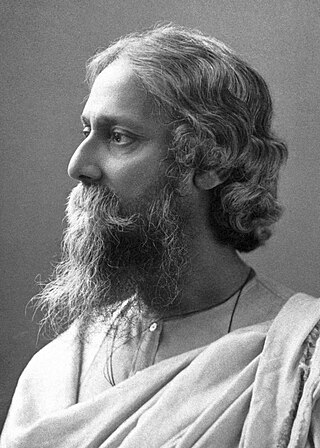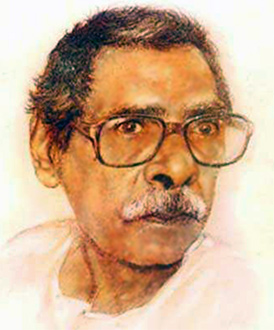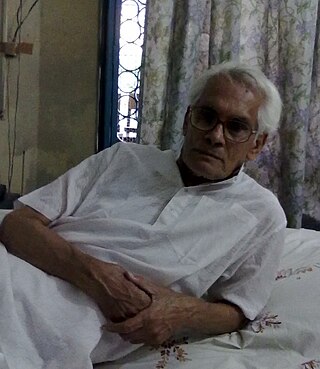
Bengali poetry is a rich tradition of poetry in the Bengali language and has many different forms. Originating in Bengal, the history of Bengali poetry underwent three successive stages of development: poetry of the early age, the Medieval period and the age of modern poetry. All ages have seen different forms of poetry and poetical tradition. It reached the pinnacle during the Bengali Renaissance period although it has a rich tradition and has grown independent of the movement. Major Bengali Poets throughout the ages are Chandidas, Alaol, Ramprasad Sen, Michael Madhusudan Dutt, Nabinchandra Sen, Rabindranath Tagore, Dwijendralal Ray, Satyendranath Dutta, Kazi Nazrul Islam, Jibanananda Das, Jasimuddin, Sukanta Battacharya, Al Mahmud.
The Hungry Generation was a literary movement in the Bengali language launched by what is known today as the Hungryalist quartet, i.e. Shakti Chattopadhyay, Malay Roy Choudhury, Samir Roychoudhury and Debi Roy, during the 1960s in Kolkata, India. Due to their involvement in this avant garde cultural movement, the leaders lost their jobs and were jailed by the incumbent government. They challenged contemporary ideas about literature and contributed significantly to the evolution of the language and idiom used by contemporaneous artists to express their feelings in literature and painting.

Malay Roy Choudhury was an Indian Bengali poet, playwright, short story writer, essayist and novelist who founded the Hungryalist movement in the 1960s.

Binoy Majumdar was a Bengali poet who received the Sahitya Akademi Award in 2005.
Krittibas is a Bengali poetry magazine that first appeared in Kolkata in 1953. It played a highly influential role in the Kolkata literary scene in the decades after Indian independence and provided a platform for young, experimental poets, many of whom went on to become luminaries of modern Bengali poetry.
The little magazine movement originated in the 1950s and 1960s in many Indian languages like Bengali, Tamil, Marathi, Hindi, Malayalam and Gujarati, in the early part of the 20th century.
Swadesh Bharati is a Hindi poet, recipient of "Premchand Award" and "Sahitya Bhushan Award". He lives in Kolkata from where he edits Rupambara, a literary bilingual quarterly journal. He has been in active field of creative writing since more than 45 years. He is chairman of Rashtriya Hindi Academy and was guest lecturer at Madaras Christian Academy.

Sandipan Chattopadhyay was an Indian Bengali writer. His 1961 book "Kritadas Kritadasi" changed the landscape of Bengali fiction and made his name. A staunch anti-establishment figure and a supporter of creative freedom, Sandipan for some time refused association with the big Bengali publishing houses.

Bishnu Kumari Waiba, also known as Parijat was a Nepali writer and poet of Nepali language. She is best known for her novel Shirishko Phool, for which she won the Madan Puraskar, becoming the first woman to receive the award. She published multiple novels and wrote many poems and stories in her lifetime.

Samir Roychowdhury, one of the founding fathers of the Hungry Generation, was born at Panihati, West Bengal, in a family of artists, sculptors, photographers, and musicians. His grandfather Lakshminarayan, doyen of the Sabarna Roy Choudhury clan of Uttarpara, had learned drawing and bromide-paper photography from John Lockwood Kipling, father of Rudyard Kipling, who was Curator at the Lahore Museum, and thereafter established the first mobile photography-cum-painting company in India in the mid-1880s. The company was later taken over by Samir's father Ranjit (1909–1991). Samir's mother Amita (1916–1982) was from a progressive family of 19th-century Bengal renaissance.
Subimal Basak is an Indian fiction writer. He is a member of the Hungry generation, with Samir Roychoudhury, Falguni Roy, Shakti Chattopadhyay and the movement's creator Malay Roy Choudhury.

Anil Karanjai was an accomplished Indian artist. Born in East Bengal, he was educated in Benaras, where his family settled subsequent to the Partition of the Indian subcontinent in 1947. As a small child he had spent long hours playing with clay to make toys and arrows. He also began very early to draw animals and plants, or whatever inspired him. In 1956 he dropped out of school to become a full-time student at Bharatiya Kala Kendra, headed by Karnaman Singh, a master of the Bengal school and a Nepali by origin. This teacher encouraged Anil to experiment widely and to study the art of every culture. Anil remained here until 1960, exhibiting regularly and teaching other students. During the same period, he practised miniature painting at Bharat Kala Bhavan under the eye of the last court painter to the Maharaja of Benaras. He also enrolled at Benaras Polytechnic to learn clay modelling and metal casting.

Basudeb Dasgupta was an Indian novelist and short-story writer associated with the Hungry generation movement in Bengali literature. He is considered one of the most significant avant-garde and controversial figures in the history of Bengali literature.
Falguni Roy was an anti-establishment Bengali poet born in Kolkata, West Bengal, India. Along with Shakti Chattopadhyay, Malay Roy Choudhury, Samir Roychoudhury, Subimal Basak, Debi Roy, Utpal Kumar Basu, Binoy Majumdar, Sandipan Chattopadhyay, Basudeb Dasgupta, Roy was also associated with the Hungryalist movement. Anti-establishment poet Tushar Roy was his brother.

Rabindra Guha is a Bengali poet of the Hungry generation movement in literature who subsequently started the Neem Sahitya Andolan with Mrinal Banik and Biman Chattopadhyay from the steel factory city of Durgapur in West Bengal. He has written several collections of poetry, short stories and novels. He is known mainly for the language of the Bengali diaspora which he adopted and developed for his narratives. He lived in Kolkata until the Hungry generation movement died down at the end of the 1960s, and shifted thereafter to Durgapur. At the end of 1970s, he shifted his base to New Delhi where he invented his narrative language of the Bengali diaspora, i.e. of people who live outside West Bengal. Rabindra Guha is a diasporic post-modern writer with a prolific body of work in relation to inner as well as outer diaspora. He has been a creator of language which is a fantastic combination of national and local dialect. His work had been recently accoladed in Jessore University.
Debi Roy is one of the founding fathers of the Hungry generation movement in Bengali literature. He is also the first modern Dalit poet in Bengali. He was born in a very poor family and worked as an errand boy in tea stalls of Calcutta when his parents lived in a slum in Howrah. He funded his own education and became a graduate of Calcutta University. He started writing in his childhood. Debi Roy met Malay Roy Choudhury in an office of a literary periodical in 1960 and the two of them, after discussions with Shakti Chattopadhyay and Samir Roychoudhury launched the now famous Hungryalist movement in November 1961. His Howrah slum-room was the editorial office from where the Hungryalist Bulletins and Hungryalist Manifestoes were published. Along with ten other Hungryalists, Debi Roy was arrested in 1964 on charges of obscenity in poetry, though the trial court exonerated him.

Baishey Srabon is a 2011 Indian Bengali neo-noir psychological thriller film directed by Srijit Mukherji. It is the first installment of the Srijit Mukherji Cop Universe. It was his second film. The cast consists of Prosenjit Chatterjee, Parambrata Chatterjee, Raima Sen, Abir Chatterjee and director Gautam Ghose, making a comeback after a 29-year absence.









